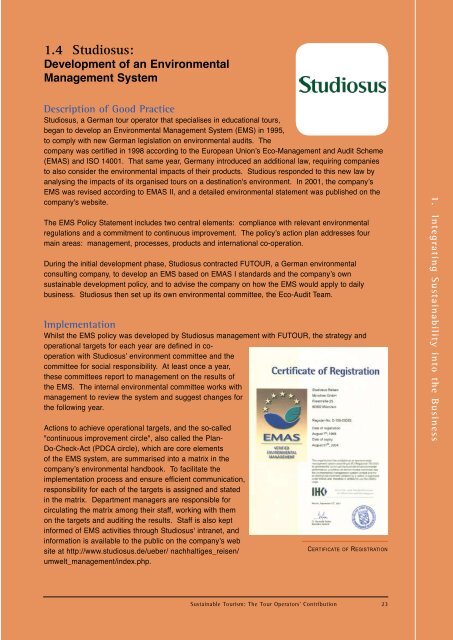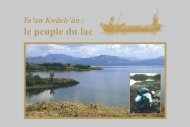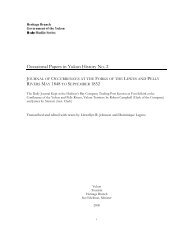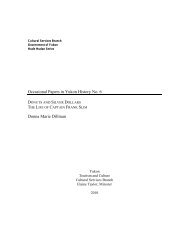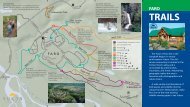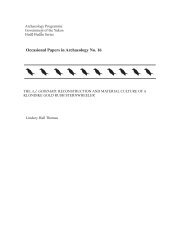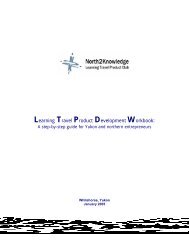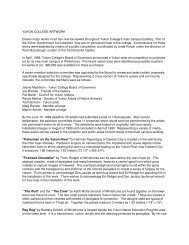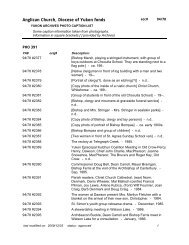Sustainable Tourism: The Tour Operators' Contribution
Sustainable Tourism: The Tour Operators' Contribution
Sustainable Tourism: The Tour Operators' Contribution
You also want an ePaper? Increase the reach of your titles
YUMPU automatically turns print PDFs into web optimized ePapers that Google loves.
1.4 Studiosus:<br />
Development of an Environmental<br />
Management System<br />
Description of Good Practice<br />
Studiosus, a German tour operator that specialises in educational tours,<br />
began to develop an Environmental Management System (EMS) in 1995,<br />
to comply with new German legislation on environmental audits. <strong>The</strong><br />
company was certified in 1998 according to the European Union’s Eco-Management and Audit Scheme<br />
(EMAS) and ISO 14001. That same year, Germany introduced an additional law, requiring companies<br />
to also consider the environmental impacts of their products. Studious responded to this new law by<br />
analysing the impacts of its organised tours on a destination's environment. In 2001, the company’s<br />
EMS was revised according to EMAS II, and a detailed environmental statement was published on the<br />
company's website.<br />
<strong>The</strong> EMS Policy Statement includes two central elements: compliance with relevant environmental<br />
regulations and a commitment to continuous improvement. <strong>The</strong> policy’s action plan addresses four<br />
main areas: management, processes, products and international co-operation.<br />
During the initial development phase, Studiosus contracted FUTOUR, a German environmental<br />
consulting company, to develop an EMS based on EMAS I standards and the company’s own<br />
sustainable development policy, and to advise the company on how the EMS would apply to daily<br />
business. Studiosus then set up its own environmental committee, the Eco-Audit Team.<br />
Implementation<br />
Whilst the EMS policy was developed by Studiosus management with FUTOUR, the strategy and<br />
operational targets for each year are defined in cooperation<br />
with Studiosus’ environment committee and the<br />
committee for social responsibility. At least once a year,<br />
these committees report to management on the results of<br />
the EMS. <strong>The</strong> internal environmental committee works with<br />
management to review the system and suggest changes for<br />
the following year.<br />
Actions to achieve operational targets, and the so-called<br />
"continuous improvement circle", also called the Plan-<br />
Do-Check-Act (PDCA circle), which are core elements<br />
of the EMS system, are summarised into a matrix in the<br />
company’s environmental handbook. To facilitate the<br />
implementation process and ensure efficient communication,<br />
responsibility for each of the targets is assigned and stated<br />
in the matrix. Department managers are responsible for<br />
circulating the matrix among their staff, working with them<br />
on the targets and auditing the results. Staff is also kept<br />
informed of EMS activities through Studiosus' intranet, and<br />
information is available to the public on the company’s web<br />
site at http://www.studiosus.de/ueber/ nachhaltiges_reisen/<br />
umwelt_management/index.php.<br />
certificate of registratioN<br />
<strong>Sustainable</strong> <strong><strong>Tour</strong>ism</strong>: <strong>The</strong> <strong>Tour</strong> Operators’ <strong>Contribution</strong> 23<br />
1. Integrating Sustainability into the Business


